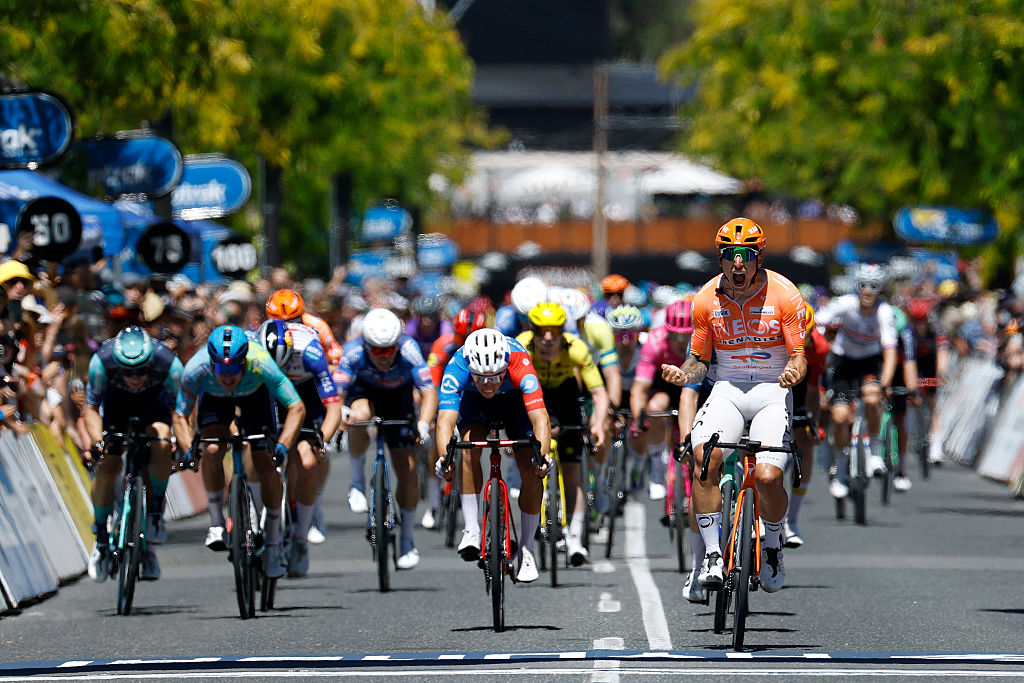Are race cancellations threatening the future of women's cycling?
The 2025 season has seen a fall in the number of lower-level race days, which undermines the pyramid and could threaten the very future of the sport. Owen Rogers investigates what's gone wrong
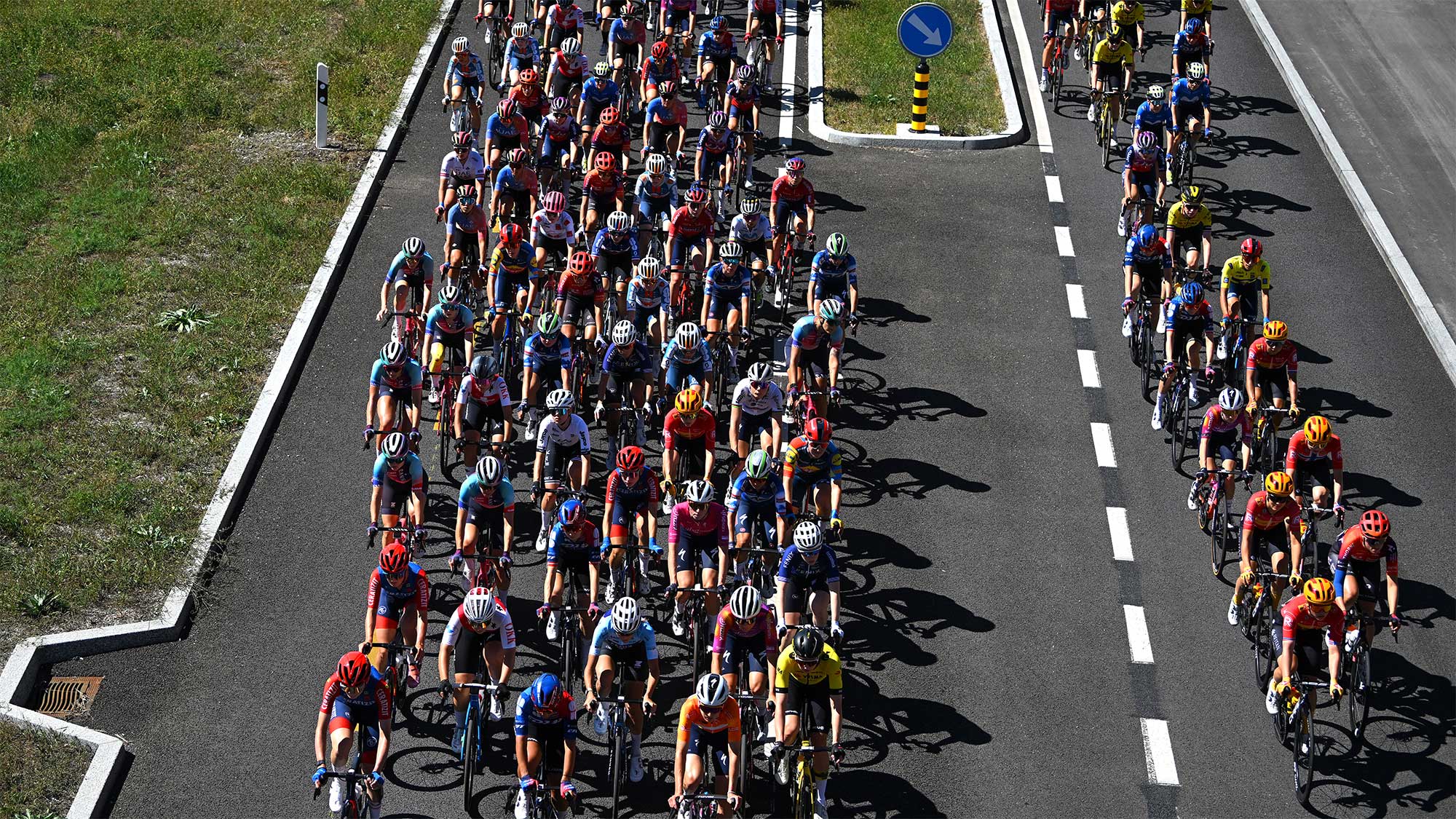
Watch any of the Women’s WorldTour races this year and you’d be forgiven for thinking the women’s side of our sport is thriving. Exciting racing, different teams and riders taking big wins, what more could a healthy sport want?
Scratch the surface, though, and it’s clear all is not what it seems, with race cancellations affecting all levels of the sport. Not only has the Tour of Scandinavia been struck from the WorldTour for good, but a raft of losses at the .2 and .1 level, the fourth and third tiers respectively, are depriving young, inexperienced riders of developmental opportunities, undermining the sport’s foundations.
Mischa Bredewold’s gripping breakthrough win at Amstel Gold added a new name to the WorldTour list of winners, even if she does represent SD Worx-Protime, the world’s most dominant team. Behind her, though, others were racing for their own less lofty victories.
"I just wanted to make it to the circuit, but I exceeded my expectations by actually being able to finish the race feeling strong throughout," said Scottish rider Morven Yeoman of the British Continental DAS-Hutchinson team.
Now 20 years old, Yeoman has been racing for more than half her life, racing in Europe as a Junior, graduating directly to senior racing in 2023. Then, after a series of DNFs, she opened her account with a very respectable 66th overall at the second-tier Festival Elsy Jacobs stage race. But three weeks later, days after her 19th birthday, her WorldTour debut at the Ford Ride London Classique was a step too far.
"Physically, it was really demanding for a young person who hasn't ever raced above 100km before," she explains. "I think the first stage of Ride London was 150km. But also really mentally challenging, having gone from being a fairly decent junior, having decent results and always being at the pointy end of a race, to barely being able to hang on to the bunch, you really struggle to understand why.
"I think racing lower-level races, .2 and the lower end .1, you can just feel a lot more comfortable in the bunch, you can control a lot more than when you've got 10-15 WorldTour teams to compete with. It's not necessarily even about the result on the day, but if you feel confident in the group, and you can use that confidence [going] into the next race, then that's where it also builds. Whereas if you're just consistently getting to 70 kilometres and then DNF, you're not actually getting that much out of it."
And therein lies the problem. If those .2 races are lost, so are development pathways for young riders like Yeoman. In 2025, only 78 days of fourth-tier racing were scheduled worldwide, down from a 2023 high of 109, and, other than the pandemic-blighted 2020 season, that’s fewer than any year since 2018. What’s more, nine of those days have subsequently been cancelled, leaving only 69 days.
At the next level up, 95 days of .1 racing were slated, more than any season since the creation of the WorldTour in 2016, but 19 have since been cancelled.
When one considers there’ll be 66 days of Women’s WorldTour racing this year, after the Tour Scandinavia’s cancellation, cycling’s hierarchy of women’s events looks more like a rectangle than a pyramid.
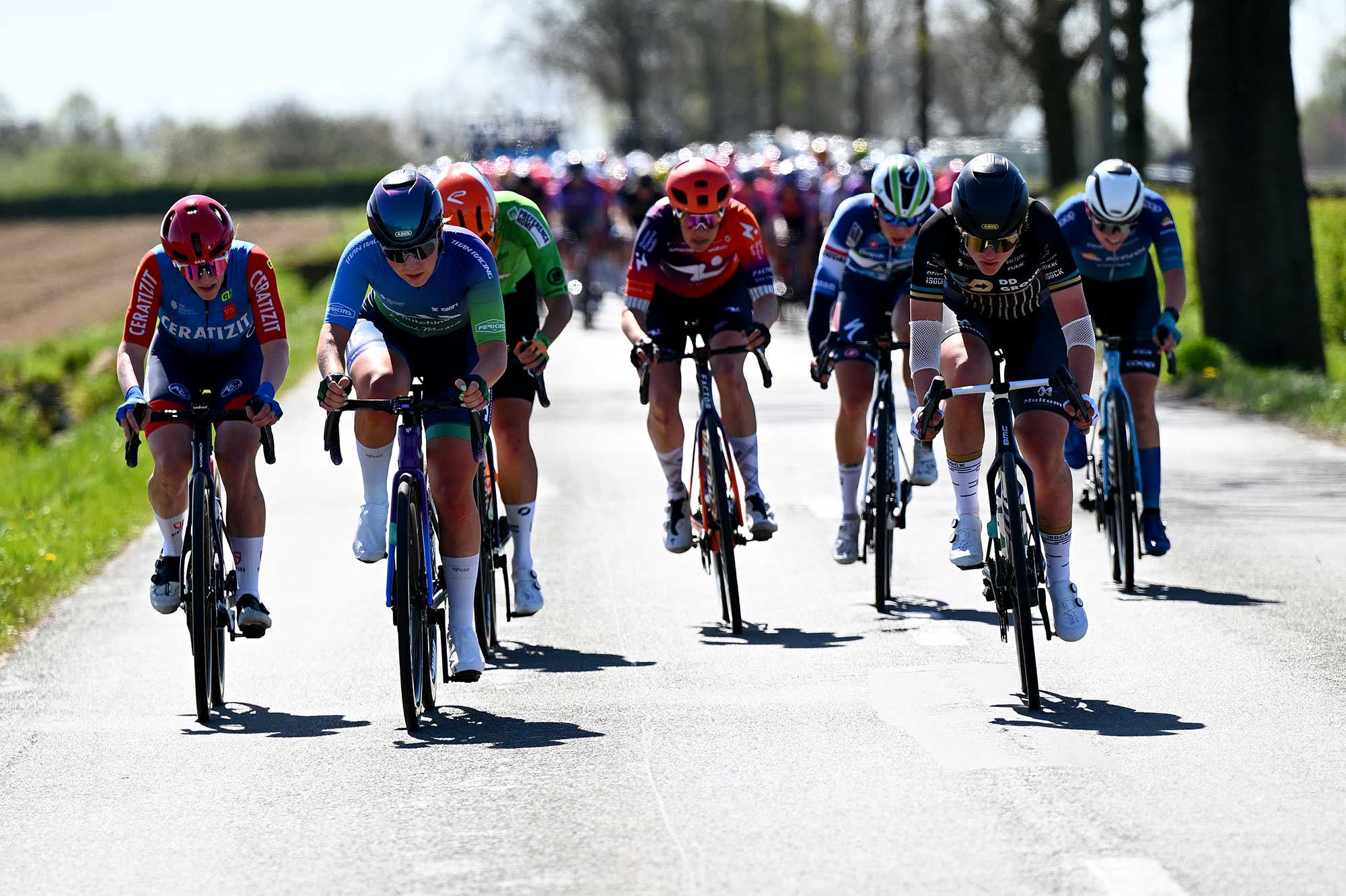
The women’s sport is not as healthy as it seems
Natascha Knaven-den Ouden established NXTG Cycling in 2018, creating a positive environment for girls and young women to develop both as racing cyclists and as people. NXTG set riders like Ally Wollaston (FDJ-Suez) and Charlotte Kool (Picnic-PostNL) on their path to the top of the sport, and while part of that team has since morphed into the AG Insurance-Soudal Women’s WorldTour squad, NXTG has continued under Knaven-den Ouden’s guidance.
She believes the lack of opportunities for an increasing number of talented, but inexperienced, young female riders will soon undermine the foundations of the Women’s WorldTour, threatening the top tier’s future.
"There aren’t enough riders to broaden the roof, so you have to widen your foundation to get enough top riders in 10 years' time, otherwise it will fold," the Dutchwoman tells Cyclingnews.
"Then we are back where we were 15 years ago, when you had to race as a junior with the elite level because there were not enough races. We are all shouting that there needs to be more teams, there needs to be more WorldTour races, but you can’t fill these races and these teams with high-quality riders.
"When Demi Vollering quits or Lotte Kopecky quits, who’s the next? Demi Vollering is a benchmark, a role model, but on the other side, she always says ‘it all starts with dreaming,’ but if it goes on like this, it will stay a dream for the youngsters."
Knaven-den Ouden believes hype is driving the women’s sport too fast, and it’s too early to compare the men’s and women’s sports.
"What you see is that men’s cycling in general has evolved; it is organically grown. The smaller Continental teams, which were not healthy, folded, and the healthy ones stayed. They built a Pro Continental [now ProTeam] level and then a WorldTour level, and that was organically grown in 25 years. Also, the market, the sponsor money, and the budgets have grown organically.
"What you see in women’s cycling with all the hype on the equality side, that women have to have the same as the men, is made artificially in five years, and that’s not healthy, it’s not sustainable. And then the whole base, the foundation, is forgotten.
"Then you see these .2 races and .1 races folding. That’s the platform for young talent to stick their nose to the window and develop, because young talent needs races to learn how to race, because cycling is one of the most complex sports in the world."
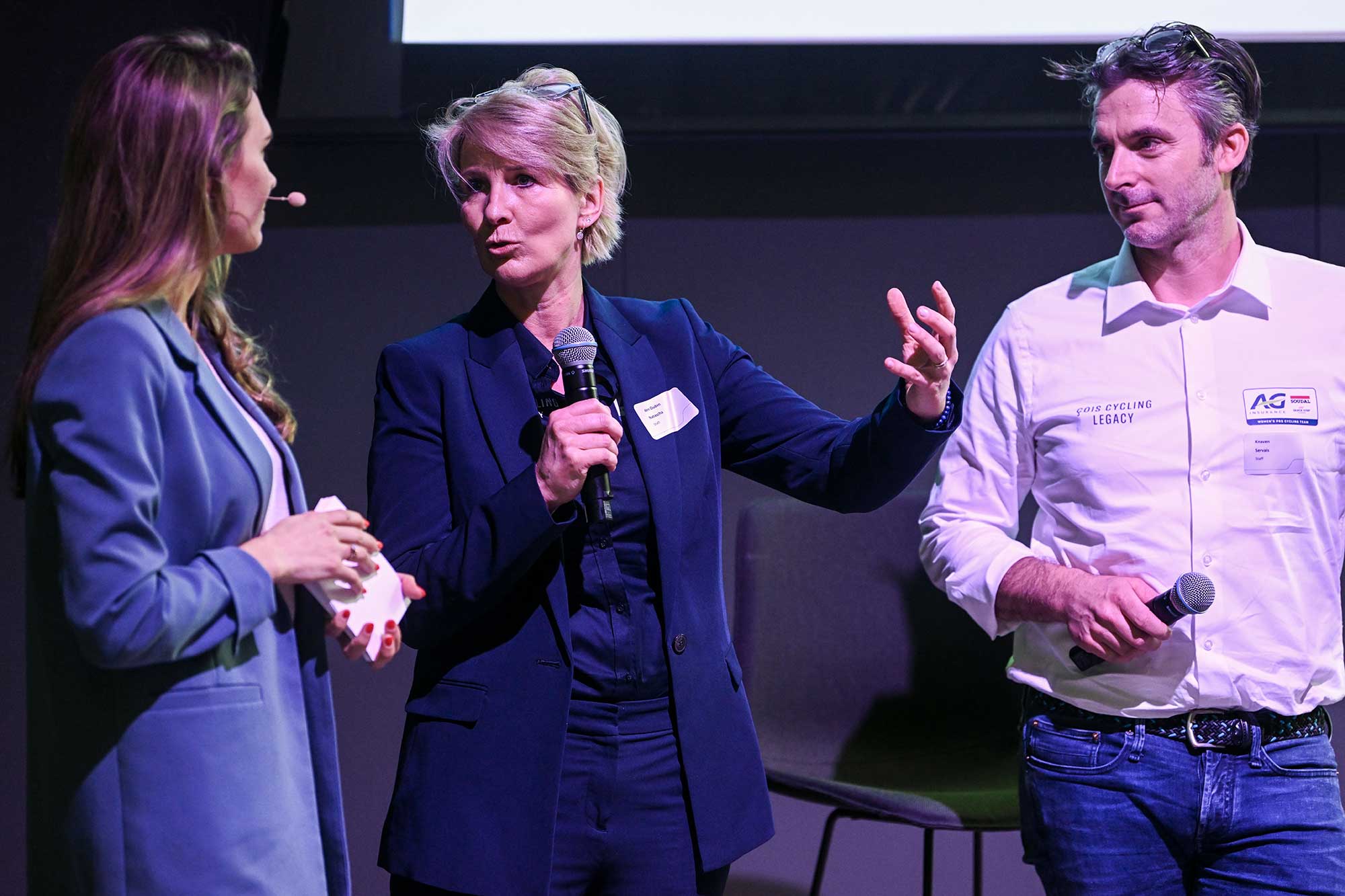
The Teams
Thanks to the success of world champion, Lotte Kopecky (SD Worx-Protime) and sprinter Jolien D’hoore before her, Belgium has experienced a huge increase in the numbers of girls and women racing. However, even in a country many would consider as one of the sport’s international heartlands, quality racing is often hard to come by.
"There are a lot of kermesse races, national races on club level, and then we have a lot of WorldTour races, but those .1 and .2 races they're not there," explains D’hoore, now the sporting manager at AG Insurance-Soudal and their Under 23 Development team. The team’s raison d’être was to give their young women the chance to race those lower-level UCI races.
"Half of their programme is just gone, which is a bit of a shame, and we have instead to give them kermesse races in Belgium. There are a lot of big races, everybody's seeing the big stars on television, but the races below, especially in Belgium, they're being cancelled."
For some, though not D’hoore’s U23 team, if lower-level races are unavailable, young, inexperienced riders are cast into the cauldron of the WorldTour. Okay, once or twice maybe, but with dire consequences if that’s the only racing they’re getting.
"You get to race against Kopecky and SD Worx and against the big names, those riders are idols for them, and it's fun. But after a while, when you only race in the beginning of the race, it gets annoying, and then you're thinking, ‘Okay, why am I doing this? Why am I training this hard?’ and they lose the joy in cycling, and they quit eventually," explains D’hoore.
The issue of cancelled races extends beyond Belgium. Canyon//SRAM zondacrypto are another Women’s WorldTeam with a development offshoot, though their Generation squad operates slightly differently, developing both promising young riders and those from under-represented countries. They would normally begin the season with national level races, before progressing to the lower tiers of international competition, aiming for .2 stage races.
"By the regulations, .1 races can be up to seven WorldTour teams, this is what we want to avoid, especially if we are going there with a full squad of [the] development team," asserts team manager, Adam Szabó. "And stage races are better from a development or a learning perspective. If you make a mistake, we can talk about those mistakes straight away, and then you can apply the learnings the day after, you don't need to wait for another week."
In previous years, they raced the Vuelta Extramadura, but with that race stepping up to the third-tier .1 level, and five WorldTeams on the start list, the team decided their riders would be best served in Italy at Trofeo Ponente in Rosa. However, just five days before the start, that race was cancelled, organisers lacking funds. That meant the Generation squad’s first UCI race as a team was Festival Elsy Jacobs, on May 3rd.
Yeoman’s DAS-Hutchinson team were another team affected by the cancellation of Trofeo Ponente in Rosa, the late cancellation leaving more than a dent in the riders’ programmes, team co-principal Simon Howes told Cyclingnews.
"Cancellations are obviously really challenging, but it’s late cancellations that are the most challenging. I completely understand why organisers do it, they’re hanging on to get the funding in place, but we’d paid for flights, so that’s money lost. Not only does it affect your programme, it also affects your budget because money spent on that is money you don’t have to go to a replacement [race] or another stage race."
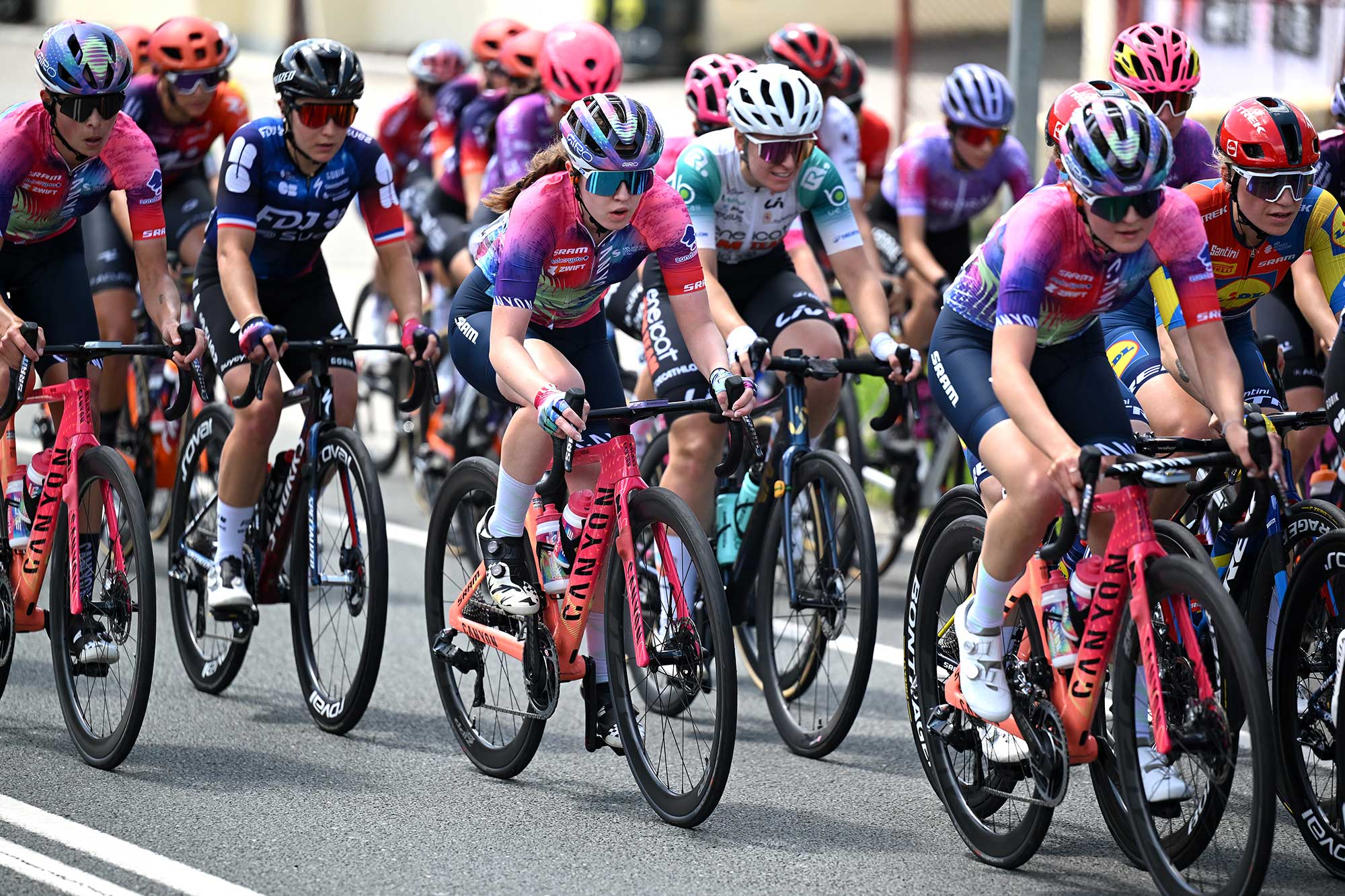
The race organiser’s view
The cycling calendar has always been a moving feast, with new races coming and older events going for a multitude of reasons. The COVID-19 pandemic condemned some to history, while others always seemed more a flight of fancy than a serious proposition; the Tour de Femina Malaysia was scheduled every year from 2020 to 2024 but never happened. And staging the International Syrian Tour in either 2022 or 2023 would always have been impossible given the conflict ravaging the country.
Cancellations are not a new thing, but they are on the increase. In the four years between 2016 and 2019, a total of three women’s .2 and .1 race days were lost after being published on the UCI’s calendar. In 2023 alone, that number was 36. So far in 2025, it’s 28, and that’s without the intervention of extreme weather, which has previously accounted for some losses.
Financial problems seem to be the main culprit, even at the top of the sport. In 2023, the WorldTour-level Women’s Tour was cancelled after several years spent searching for a title sponsor alongside organisers, Sweetspot, going out of business. Luckily, British Cycling stepped into the breach, renaming the event the Lloyds Tour of Britain. The Tour of Scandinavia was less fortunate. Beginning life in 2014 as the three-day Ladies Tour of Norway, it was cancelled in 2024, then, earlier this year, organisers pulled the plug for good, accepting it was not financially viable.
Festival Elsy Jacobs has been on the calendar since 2008, starting life as a one dayer then moving to three days, including a prologue. It’s been at .2 level, up to ProSeries and is now two 1.1 races. Marianne Vos (Visma Lease a Bike), Anna van der Breggen (SD Worx-Protime) and Kasia Niewiadoma (Canyon//SRAM zondacrypto) are all former winners, but it's clash with the Vuelta Feminina means it can no longer attract the big names.
"We have to adapt, not to have the big names but the big names of tomorrow," says Michel Zangerlé, president of the organising club, SaF Zéisseng. "We got ProSeries [status] for 2020, but of course we had to cancel, so the first edition as ProSeries was in 2021, until that point we grew from year to year, but it was difficult to maintain because there were always more costs and more workload. Security issues are one point, but not the only one."
Like many events at this level, everyone involved is a volunteer. Hiring professional help would cost more, and even in Luxembourg, per capita, the European Union’s richest country, raising the required €135,000 (£114,000/US$ 152,000) is an issue. This year, they operated a small deficit after Ceratizit, title sponsors since 2021, withdrew, leaving a hole in the budget, some of which was filled by the government.
Zangerlé is not optimistic about the future. "It will not be bright, I do not know if it will be worse than now, I don’t think so, but there will be some races that will disappear." While he acknowledges the Vuelta clash is a hindrance, he accepts the presence of big organisers is a benefit to the women’s sport, but would like the UCI to help in at least one way.
"Organising the calendar better would be a great thing, I think, if they did not put us and the Vuelta on the same day, perhaps we would even stay as ProSeries, but managing the calendar as bad as they do was not good for us."
Knaven-den Ouden believes the introduction of a league where smaller Continental teams and larger club teams can earn UCI points would help breathe life into lower-level races. D’hoore suggests staging more races on local circuits could cut organisers’ costs, while Szabó thinks teams can help promote races, especially on social media, where they have far larger followings.
As for the UCI, they were approached for comment twice but have failed to respond in time for publication.
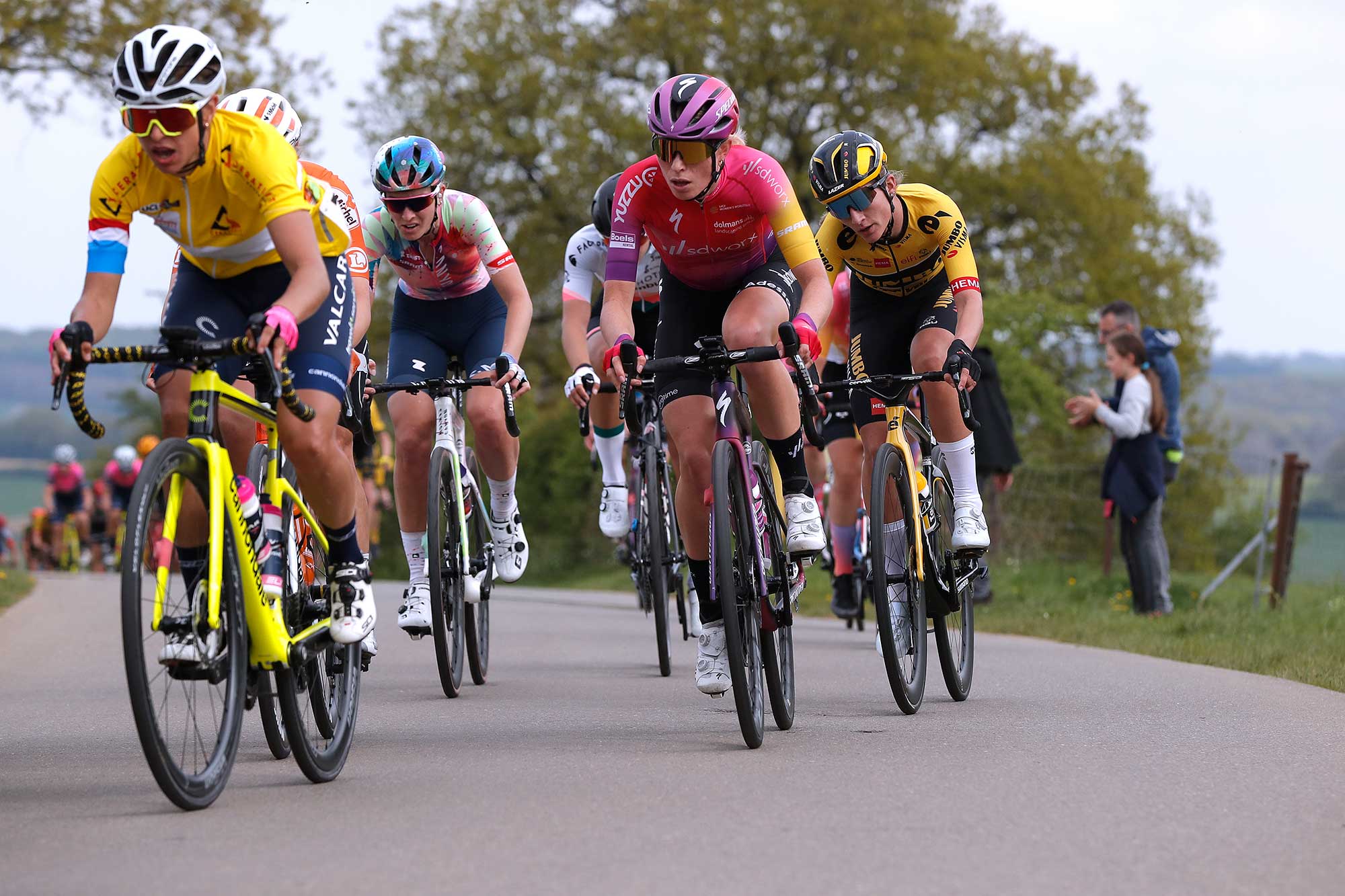
What’s next?
So, how long have we got before the crumbling foundations begin to show?
"When Demi [Vollering] and Lotte [Kopecky] quit cycling, what’s next?" asks Knaven-den Ouden. "Will they still be there until their 40s? Will we have 12 years of the same names? It’s always the same names. Cat Ferguson and Imogen Wolff come in; they are big talents, but where’s the rest? You have to have a big peloton, you want to have 150 riders of good quality."
Clearly, things are not as they should be, and Knaven-den Ouden’s prediction may be a worst-case scenario given there is certainly increased depth, just look at the Vuelta Feminina where a large group survived onto the last climb.
Mischa Bredewold didn’t start Amstel Gold as a favourite, indeed, her victory is an illustration of how the women’s sport has developed. Rewind 10 years to a time when a living wage was an exception, now there is a minimum wage at World and ProTeam level. In 2014, fans would scour Twitter for race updates; now we can watch the top riders race the biggest races and read a steady flow of quality interviews and analysis.
Societal change, the creation of the WorldTour series of races and the UCI’s subsequent insistence that all those events be shown live have undoubtedly been key in the sport’s development. The Tour de France Femmes avec Zwift turbocharged that.
However, the sport’s base has consistently been ignored, and the sport is facing issues which must be addressed to ensure progress made is not wasted. And that girls and women can continue to dream of a secure future in a truly professional sport.
Owen Rogers is an experienced journalist, covering the sport for various magazines and websites for more than 10 years.
Initially concentrating mainly on the women's sport, he has covered hundreds of race days on the ground and interviewed some of the sport's biggest names.
Living near Cambridge in the UK, when he's not working you'll find him either riding his bike or playing drums.
You must confirm your public display name before commenting
Please logout and then login again, you will then be prompted to enter your display name.
